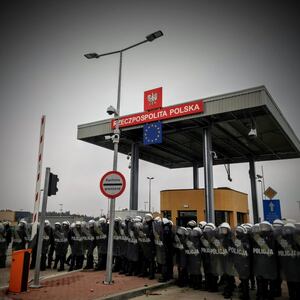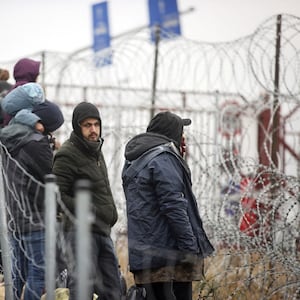KUZNICA, Poland—After a night filled with tear gas, water cannons, and fireworks, Tomas, a tall, fair-haired Polish border guard, looked haggard.
“None of us want to be doing this job,” he told The Daily Beast as he stood in a police station in the small Polish border town of Kuznica. His colleague, a short young woman with curly black hair, looks like she hasn't slept in days. “Everyone is exhausted,” she says, as she slumps her head forward.
Over the past month, the quaint town—which is home to under 2,000 people—has been thrust into the center of a major geopolitical migrant crisis. Tomas and his colleagues spent the previous evening repelling waves of refugees trying to cross the EU border from Belarus, leading to some violent confrontations. “Today is quiet, but last night was pure chaos,” he said.
That Thursday evening, I had been picked up for entering a restricted area in an effort to interview migrants (journalists are barred from a three-kilometer ‘exclusion zone’ by the border). But rather than directing their anger at me, the border police had choice words for a certain dictator. “We just want to go back to our homes and our families and live our normal lives,” said Tomas. “It’s all the fault of the lunatic president over there,” he adds, gesturing his thumb behind us towards Belarus.
Nearly 17,000 Polish police, military and security officials have been sent to guard the country’s border from a refugee crisis orchestrated by the dictator next door. Thousands of refugees have been stranded here for months on the invitation of Alexander Lukashenko, the president of Belarus who has ruled the country for 26 years. Belarus has been sanctioned by the EU over the brutal suppression of nationwide protests that broke out against what was widely considered a rigged national election in August of last year.

Belarussian President Alexander Lukashenko speaks during a joint press conference at the Kremlin on September 9, 2021 in Moscow, Russia.
Mikhail Svetlov/GettyBoth as a bargaining chip and as revenge, Belarusian travel agencies have been flying in thousands of people from war-torn regions such as Iraq, Afghanistan, and Syria to Minsk and shuttling them to the EU border, where they attempt to cross over through Poland and other Eastern European countries. Some dozen migrants have died from poor conditions and freezing temperatures, including one Syrian toddler.
It appears that of the many journalists who have been detained here, I was one of the lucky ones who got off with just a small fine. Just on Tuesday, three journalists in another border region reported being handcuffed and threatened despite identifying themselves as press. One local reporter told The Daily Beast that colleagues of his had their vehicle smashed by unidentified masked men dressed in military gear. But this is nothing compared to the suffering of the refugees who have found themselves pawns in a dangerous geopolitical game.
The exclusion zone applies not just to journalists, but also to NGOs and aid workers. Only military and residents of the towns are allowed in with a special permit. Red Cross workers have also reported being denied access to the area. Anya, a volunteer for the NGO Doctors on the Border, told The Daily Beast that they are one of the only organizations that are equipped to help those in need. “But because we work within Polish law, we can’t enter the zones where we can do the most help. We can only operate in border areas that aren't under emergency legislation,” she said.
Some activists and aid workers refuse to be deterred by the Polish government’s harsh restrictions. Instead, they have opted to sneak in and out of the excluded border regions to provide aid and comfort to those suffering in the cold. They bring food, blankets and even set up temporary medical aid stations. If caught, they face a $300 fine for the first offense, but can be prosecuted under new national security legislation if detained a second time.
A woman who manages one of these groups, who wanted to be referred to only as Mia, was concerned that she may be targeted by the security services. “If I wanted to be frank with you about everything, I’d need to throw my phone out the window,” she told The Daily Beast.
Many refugees had little idea of the grim winter conditions they would be facing on the border, and have few warm clothes. It is bitterly cold. “If they don’t starve,” Mia said, “they will freeze instead.”
Organizations on the ground have also pointed a finger at Polish authorities, accusing them of inhumane and cruel treatment both towards refugees and aid workers.
“If we bring someone to a hospital in Bialystok [the closest major city], the border guards will escort them and bring them back as soon as we’ve given emergency care. Someone who has just had an operation could be thrown right back in the snow,” Mia explained. She also said that she and her colleagues would sneak in lawyers to the restricted zones who would bring the documents necessary to help migrants file asylum claims, and then drop the paperwork with the Polish authorities. This rarely if ever worked, she said, and the vast majority of asylum claims were being rejected.
We don’t have precise figures on the number of migrants stuck at the border, but between 5 to 10 thousand are the rough guesses of those who spoke with The Daily Beast.
After an EU diplomatic effort spearheaded by Germany, Lukashenko is giving some signs of backing down. Belarusian state media has reported that the state has now begun to clear the main border camps and relocate refugees to nearby warehouses. But thousands of others, especially those who have made it over the EU border, are believed to be still hiding in the Polish woodland.







